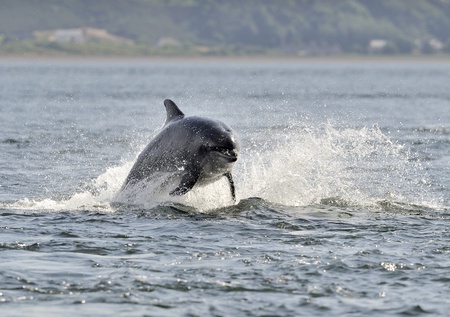The world’s most northerly resident population of bottlenose dolphins is stable and may even be increasing, according to new research.
The world’s most northerly resident population of bottlenose dolphins is stable and may even be increasing, according to new research.
The east coast of Scotland is home to around 195 dolphins, the only resident population of bottlenose dolphins in the North Sea. They are a regular tourist draw around the east coast and one of the most recognisable species in Scotland.
The report was commissioned by Scottish Natural Heritage (SNH) which has a duty to report on the condition of bottlenose dolphins within the Moray Firth SAC (Special Area of Conservation) every six years.
The University of Aberdeen has carried out more than two decades of monitoring using photographic analysis of individuals’ dorsal fins and other identifying characteristics. And recently passive acoustic monitoring has been undertaken as part of the project.
Scientists found the dolphins had broadly similar patterns of use over the period 2005 to 2010 although their movements did change from year to year; possibly due to changes in the food supply.
Morven Carruthers, SNH policy and advice officer, said: “We can say with some confidence that the population of bottlenose dolphins on the east coast of Scotland is stable or increasing. And the number of dolphins using the Moray Firth SAC between 1990 and 2010 appears to be stable.
“However, this population is considered vulnerable due to being small and isolated from other populations.
“The east coast bottlenose dolphins are a special part of Scotland’s nature and wildlife and a major tourist attraction, and it is encouraging to see that the population is currently stable. Monitoring will continue to observe the dolphins and help ensure that they do well.”
The Moray Firth SAC extends from the inner firths to Helmsdale on the north coast and Lossiemouth on the south coast. Bottlenose dolphins are protected under the EU Habitats Directive wherever they occur in the wider marine environment; not just within the boundary of the SAC.
Since 1989 this population of bottlenose dolphins has been the focus of an intensive research programme led by the University of Aberdeen and the University of St Andrews.
The Moray Firth SAC Management Scheme includes a progressive action plan as well as best practice guidelines covering a range of potential impacts and activities. It also supports the work carried out underthe Dolphin Space Programme (DSP) to promote sustainable and educational dolphin-watching opportunities in the Moray Firth.
And now the DSP has scooped a top conservation prize. It won the Marine Award at the recent RSPB Nature of Scotland Awards in the face of stiff competition from across the country.
Kathryn Logan, manager of the Moray Firth Partnership, said: “This award recognises the achievements of the long-term collaboration between Moray Firth dolphin tour boat operators, environmental, regulatory, tourism and other bodies.
“The Dolphin Space Programme enables exciting and sustainable wildlife watching experiences while helping protect the iconic bottlenose dolphin population.
“As the tourist season is gearing up we encourage everyone to ‘watch how they watch’ by using one of the accredited tour boat operators under the DSP or by watching from the shore. Even small recreational boats and canoes can cause a disturbance to dolphins and other wildlife, so sticking to the code of conduct will help make sure no disturbance occurs.”


